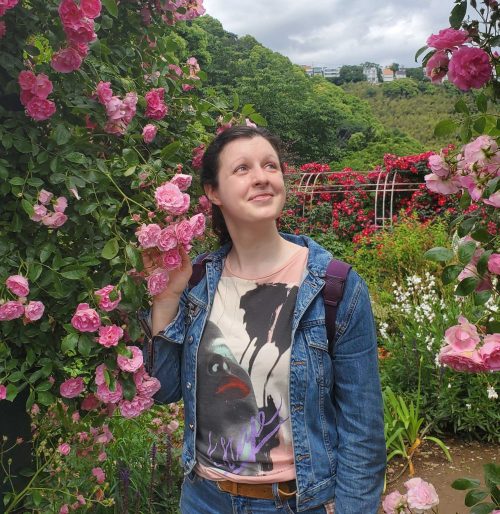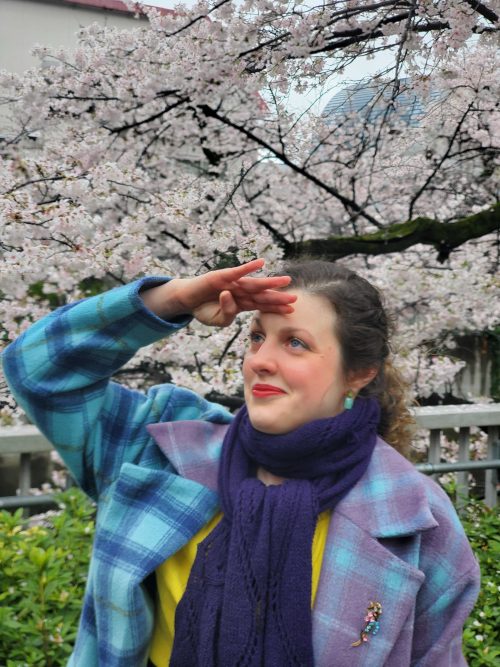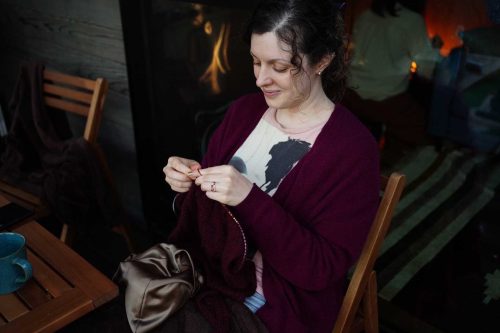Meet the Node correspondents: Dina Mikimoto
Posted by Reinier Prosee, on 25 April 2023
We recently announced that we will be working with three newly appointed the Node correspondents, who will be helping us to develop and write content for the Node in 2023. We caught up with each of them to chat about their research backgrounds and the topics that they’re excited to write about over the course of the coming year.

The final member of the correspondents team (which also includes Brent Foster and Alexandra Bisia) is Dina Mikimoto. Dina works as a Postdoctoral Researcher at the University of Tokyo in Japan. She has moved from the field of analytical chemistry into the field of tissue engineering which also involved her moving from Moscow to Tokyo. We discuss the challenges and opportunities that arose from this transition. Also, we talk about the importance of explaining her own work (and work within the wider tissue engineering field) in a clear and concise way – whether to friends or colleagues – and how joining the correspondents team can help her to achieve this goal.
Congratulations on being selected as one of our new the Node correspondents. How did you find out about the role, and why did you decide to apply for it?
I found out about this opportunity while browsing the Node website. During the last year, I’ve been doing quite some thinking about the things I like most about research. I concluded that it is writing papers, drawing schemes for these papers, and then trying to explain the findings in these papers in very simple terms. Actually, I find that many people – whether friends or colleagues – misunderstand what I’m working on which makes explaining my work in a clear and concise way even more important to me.
I was thus looking for ways to communicate my research in a more systematic way. So when I saw this opportunity on the Node, I thought it was a perfect fit. Many of the things that appear on the Node are very close to my heart (and research field!). In my role as the Node correspondent, I hope to surround myself with people who can help me further develop my communication style and help me express myself and my ideas clearly.
Have you done any science writing before, or will this be a new experience for you?
When I was a student in Moscow, I joined a science communication journal for which I wrote a few articles. I couldn’t really choose what to write about though – like one time I was asked to write about sustainable education, and I wasn’t even sure where to start. Of course, it was a really interesting and important topic, but I didn’t feel like I would be the right person to cover it. Instead, I’d rather write about something in which I’ve acquired some expertise and is closer to what I work on.
What is your current research focus? And how did you get into your current position?
I’m originally from Russia where the education system is geared towards mathematics and physics. Biology and chemistry receive less attention, though I was more attracted to these subjects straight away. Initially more to chemistry than biology as I really enjoyed the logical, systematic approach of it. But I was always torn between the two, explaining how I ended up in a PhD in biochemistry in which I studied enzymatic reactions that could be used to help diagnose certain neurodegenerative diseases.
While I was doing my PhD at the Moscow State University, I read a lot of literature about the diseases I was trying to detect with the enzyme-based biosensor I was working on. Rather than just the detection of diseases, I became more interested in work focused on preventing disease. I realised that biochemistry would not be ideally suited for me and I looked for more interdisciplinary fields. It’s how my interest shifted toward the tissue engineering field. Japan is at the forefront of tissue engineering and so I realised this might be the right place for me to go – I wanted to be at the centre of things.
So I did indeed go to Japan where my supervisor advised me to start another PhD, this time in tissue engineering. Since I finished my first PhD in Russia at the age of 25 – the time when most people in Japan start their PhD studies – I thought why not and decided to go for it. Since then, I have received my 2nd PhD and now I am trying to build a bridge between my two works.
So you ended up moving from Moscow to Tokyo – what was that like?

I had made some friends in Japan already, including my current husband. When I was doing my PhD in Moscow, a devastating earthquake hit Japan (in 2011). Japanese students at the Moscow State University organised many events to raise awareness of this disaster and I wanted to help in any way I could. I ended up befriending these students (who also studied Russian) and had already visited them a few times before my official move to Japan. It meant that when I moved, I didn’t feel alone at all. Still, it’s very difficult for foreigners to settle down in Japan. They’re very friendly, but there is a lot of difficult paperwork to complete (all in Japanese!).
I was lucky to have my friend, now husband, help me out with the paperwork. Not only this, but there are actually a lot of elderly people who actively help foreigners to settle in. When people retire in Japan, they look for a hobby: for some, this is to help foreigners. So these people know a lot about Japanese society, know nice places to visit (better even than most young people) and speak English really well. In short, they are a treasure of information and made me feel very welcome indeed. The academic atmosphere in Tokyo is also very welcoming and so I was well set up in Tokyo at arguably the epicentre of tissue engineering research.
Are you planning to write about tissue engineering for the Node? Or are you looking to branch out into other areas?
I would definitely like to write about tissue engineering first. It’s a very fluid research area with influences from many different fields of research. Just in my own lab alone, we have engineers, chemists, programmers, and biologists all working together. I think this mixture of expertise is one of the most exciting aspects of tissue engineering and I’d like to write about the origin of different ideas within this field.
I sometimes feel that tissue engineering is a bit like what the field of “alchemy” used to be: the field that wanted to turn metal into gold. Its goals are perhaps a bit too ambitious at times, but in pursuing ambitious goals many interesting and important observations are being made. Doubtless, the field of tissue engineering will evolve but in which direction is still unclear – which in itself is fascinating.
There are quite a lot of people who have strong feelings about tissue engineering and I’d definitely like to touch on some of the ethical considerations and questions within and surrounding the field. What could be interesting is to compare the regulations across different countries, as I know there is already quite a big difference between Japan and most European countries in terms of regulations.
What are you hoping to gain from the experience of being a the Node correspondent?
One of the things I’d really like to experience is what it is like to be a science writer. In the back of my mind, there is always this voice saying: “you really like to write, so maybe you should write more than you currently do. Maybe you should consider it as a possible career option.” Given my broad background, I do think this could indeed be a good way forward. Last year, when I had a bit more time on my hands, I started Tweeting for my lab, trying to explain the work we’re doing, posting funny videos about fibroblasts etc. I really loved it and look forward to doing more of this kind of work!
Finally, could you perhaps tell us something that people may not know about you? For example, what do you enjoy doing in your spare time?
I love knitting!
Here in Japan, only grannies are supposed to like knitting. But so do I, I guess. Nothing too complicated though, it needs to be relaxing. I mostly make scarfs which I have now given away to many friends and colleagues. They seem to really like them which makes me happy!

Note: You can find all the posts from the Node correspondents here: https://thenode.biologists.com/the-node-correspondents/


 (3 votes)
(3 votes)